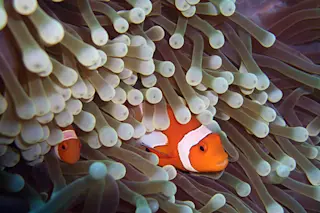Movie stardom can be a blessing and a curse, even for a fish.
the 2003 Disney/Pixar blockbuster about a young clownfish, his father, and a host of goofy aquatic animals, became the bestselling DVD of all time, according to The Times of London. While that was great news for Pixar, it turned out to be bad news for clownfish everywhere. British scientist Billy Sinclair of the University of Cumbria says that clownfish populations in the wild have been in steep decline since the movie's release five years ago, and he thinks he knows what happened: They became pets. The movie's plot centers on escape from captivity—Nemo's father travels to Sydney, Australia, to free his son from a fish tank in a dentist's office—but many Finding Nemo fans decided that they need their own clownfish in a bowl. In Australia, The Times writes, you can buy two clownfish, complete with the sea anemone in which they live, for about $50. After the film's release, Sinclair says, clownfish demand rocketed past the supply that breeding programs could produce, enticing some people to begin over-harvesting wild clownfish in order to feed the market for adorable pets. While working in Australia, Sinclair studied Keppel Bay and found that clownfish population groups had dropped from 25 to 6. He also looked at commercial fishing boats that sometimes catch clownfish in their nets and found that they had been catching fewer and fewer of the bright orange fish. Environmental causes have also contributed the clownfish's decline, Sinclair says—the fish live in coral reefs, which are threatened by global warming and other causes. But, he says, whether dying habitat or over-popularity is the biggest cause, without protection the fish could go extinct in some places, and then we won't be able to find Nemo at all. This is one situation where it pays to be ugly—after all, last year's release of
didn't seem to spark a craze for pet rats. Still, with Disney/Pixar releasing WALL-E today, perhaps janitorial robots should watch their backs. Image: flickr/CybersamX














